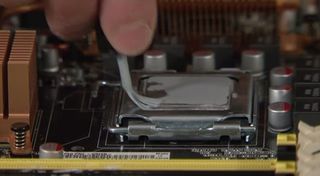Why does my PC reboot while playing a game?

Ask PC Gamer is our weekly question and advice column. Have a burning question about the smoke coming out of your PC? Send your problems to letters@pcgamer.com.
Help! My PC keeps rebooting randomly, especially when I'm playing Battlefield 4. It doesn't really do it outside of games, but if it does it's just before I save whatever I'm working on (of course). Do I have a defective motherboard or something, or is it a virus? -Robert M.
Hi Robert,
There could be a few things happening here. A virus could be to blame, sure, so do make sure you've got up-to-date antivirus software, but because it tends to happen while you're playing a game, I'm going to guess it's one of two likely hardware problems: your power supply unit (PSU) isn't supplying enough juice or your CPU is overheating.
First of all, make sure your PSU is up to the task of powering your graphics card. Assuming you have newer GPU, anything less than a 500 watt PSU is probably going to give you trouble. The power requirement will be listed with your graphics card's specs. Depending on your other hardware, you may even need a heftier PSU than the listed requirement.
It's also possible that you have a failing PSU. Do not try to open it. Unless you know what you're doing, even an unplugged PSU can be very dangerous to service, because it stores a charge. You could attempt to diagnose it with a digital multimeter or power supply tester, but if you're not experienced with electronics, I'd recommend seeking an expert's help. If you suspect it's the problem, you'll want to replace it (and it's not too expensive to do so)—but first, check on your temps.
Another reason your PC could be rebooting on its own is overheating. If the CPU gets too toasty, your PC will shut down to save itself. To help diagnose, I recommend downloading HWmonitor or Core Temp. They're both free, but be careful not to blindly hit 'agree' during installation of the latter, or you'll end up removing a gross search bar later.
Both applications are simple tools which read your CPU's thermal sensors, displaying the reading for each core. Now do something processor intensive like running a game (or a stress test) and keep an eye on it. If the temp gets anywhere over 90° Celsius, that's definitely your problem. Most CPUs are comfortable between 30° and 65°, and should never go too much over 70°C.
The biggest gaming news, reviews and hardware deals
Keep up to date with the most important stories and the best deals, as picked by the PC Gamer team.
In that case, the first thing to do is clean. Make sure all your fans are spinning and clean out any dust in your PC using an air blower or compressed air (find out why I don't recommend vacuuming).
If your PC is clean and all the fans are working, but it continues to overheat, you may need to replace or reseat your CPU cooler. Note that you can't just remove the heatsink to 'check' on it—if you remove it, you've committed yourself to cleaning off the existing thermal paste with a cloth and a tiny bit of 99% isopropyl alcohol (if needed), and applying a new layer. The complete process for installing a CPU cooler is something we'll revisit, but not much has changed since our instructional video from 2012 (above). Again, if you're not experienced with PC building, I recommend consulting with someone who is.
Those are my guesses based on the nature of the problem, but there are other possibilities. You could have defective RAM, for instance. It's not totally uncommon, so if you've ruled out the PSU and CPU, I'd give Memtest a go or run the Windows Memory Diagnostic tool.

Tyler grew up in Silicon Valley during the '80s and '90s, playing games like Zork and Arkanoid on early PCs. He was later captivated by Myst, SimCity, Civilization, Command & Conquer, all the shooters they call "boomer shooters" now, and PS1 classic Bushido Blade (that's right: he had Bleem!). Tyler joined PC Gamer in 2011, and today he's focused on the site's news coverage. His hobbies include amateur boxing and adding to his 1,200-plus hours in Rocket League.
Most Popular


